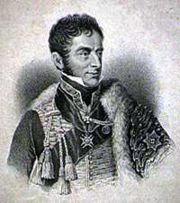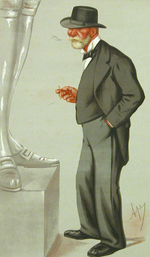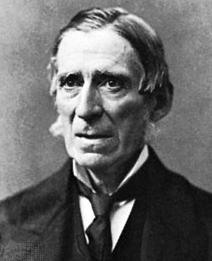Henry William Paget 1st Marquess of Anglesey 1768 - 1854
July 24, 2008
 Field
Marshal Henry William
Paget,
1st Marquess of Anglesey
KG
GCB
GCH 1768 – 1854 was
a British military leader and politician, now chiefly remembered for
leading the charge of the heavy
cavalry
against
d’Erlon’s
column during the Battle of
Waterloo.
Field
Marshal Henry William
Paget,
1st Marquess of Anglesey
KG
GCB
GCH 1768 – 1854 was
a British military leader and politician, now chiefly remembered for
leading the charge of the heavy
cavalry
against
d’Erlon’s
column during the Battle of
Waterloo.
Henry William Paget was the Vice President of the London Homeopathic Hospital, and he was a patient of Hugh Cameron, Samuel Hahnemann, Giuseppe Mauro, and Frederick Hervey Foster Quin, and a friend of Charles Mansfield Clarke 1st Baronet, Charles Locock 1st Baronet,
Hugh Cameron was the private homeopathic physician of Henry William Paget, who had encouraged Hugh Cameron to travelled to Paris to study under Samuel Hahnemann. Hugh Cameron subsequently lived with Henry William Paget for over 20 years.
Henry William Paget was the grandfather of George Henry Charles Byng 3rd Earl of Strafford. His daughters were close friends and travelling companions of William Francis Cowper Temple 1st Baron Mount Temple (1811-1888) (James Gregory, Reformers, Patrons and Philanthropists, (Taurus Academic Studies, 2010). Page 17).
Henry William Paget was the Vice President of the London Homeopathic Hospital. Paget was active in the foundation of the London Homeopathic Hospital, which was established at 32 Golden Square in 1851. He was a was a colleague of Frederick Hervey Foster Quin, the first President of the British Homeopathic Society, and Marmaduke Blake Sampson, the Chairman of the British Homeopathic Association, and many other homeopaths.
In the Homeopathic Medical Directories (see British and Foreign Homeopathic Directory compiled by Frederick Hervey Foster Quin and George Atkin) there are lists of patrons of the dispensaries and hospitals.
They read like an extract from Burke’s or Debrett’s. Some examples include: the Duke of Beaufort, Duke of Cambridge, Marquesses of Anglesey, Arthur Algernon Capell 6th Earl of Essex, John Gray 15th Lord Gray, Arthur de Vere Capell Viscount Malden, Richard Walter Hely Hutchinson 6th Earl of Donoughmore, Lord Ernle, Earl of Kintore, Arthur Fitzgerald, 10th Lord Kinnaird, Duchess of Hamilton and Brandon, Francis Richard Charteris 10th Earl of Wemyss Lord Elcho, the Lords Paget, George Granville William Sutherland Leveson Gower 3rd Duke of Sutherland, Earls of Dudley, George Wyndham 1st Baron Leconfield, Thomas Egerton 2nd Earl of Wilton, George Thomas Keppel 6th Earl of Albemarle, William Coutts Keppel Viscount Bury 7th Earl of Albemarle, John Robert Townshend 1st Earl Sydney, Lady Radstock, Mary Adelaide of Cambridge Duchess of Teck, Duke of Northumberland, Earl of Scarborough, Earl of Dysart, Marchioness of Exeter, Sarah Waldegrave, Countess of Waldegrave, Countess of Crawford and Balcarres, Lord Headley, Earl of Plymouth, Lord Calthorpe, John Talbot 16th Earl of Shrewsbury, Lord Horder, Joseph Albert Jack Pease 1st Baron Gainford, Lord Moynihan, Lord Ernle, Lord Ampthill, Lord Home, Viscount Elibank and the Earls of Lichfield. And to this list we can also add numerous knights, barons, Army officers and clerics.
Henry William Paget was badly injured in the Battle of Waterloo in 1815. His leg was hit by a cannon shot and required amputation. Paget suffered terrible pain in this leg for twenty one years until he was treated by Samuel Hahnemann in 1836.
Lord Uxbridge’s leg was shattered by a grape-shot at the Battle of Waterloo and removed by a surgeon. The amputated limb went on to lead a somewhat macabre after-life as a tourist attraction in the village of Waterloo in Belgium, where it had been removed and interred.
Five days later, the Prince Regent created him Marquess of Anglesey and made him a G.C.B., among other decorations from the allied sovereigns. A 27m high monument to his heroism (designed by Thomas Harrison) was erected at Llanfair PG on Anglesey, close to his country retreat at Plas Newydd, in 1816. A separate monument to his leg was apparently erected at Waterloo.
Agnes Paget ?1810 - 1845, daughter of of Henry William Paget, was married to George Byng 2nd Earl of Strafford, and their son George Henry Charles Byng 3rd Earl of Strafford asked David Wilson to sponsor beds at St. George’s Hospital in return for conducting clinical trials into homeopathy at that hospital - an offer which was refused.
 Lord Alfred
Paget - son of Henry
William Paget, appears in The British and Foreign Homœopathic Medical
Directory and
Record
in 1855 and The London and Provincial Homœopathic Medical
Directory
in 1866 and The Homeopathic Medical Directory of the Great Britain and
Ireland
in 1872.
Lord Alfred
Paget - son of Henry
William Paget, appears in The British and Foreign Homœopathic Medical
Directory and
Record
in 1855 and The London and Provincial Homœopathic Medical
Directory
in 1866 and The Homeopathic Medical Directory of the Great Britain and
Ireland
in 1872.
 Admiral
**Lord Clarence Edward Paget**
**(1811-1895) *-
son of Henry William Paget appears in [The British and Foreign
Homœopathic Medical Directory and
Record](http://books.google.com/books?id=iBU4AAAAMAAJ&pg=PA55&dq=Paget+homeopath&lr=&ei=_TBtSNuXA4fKjgHRyPWLCA)
in 1855 and [The London and Provincial Homœopathic Medical
Directory](http://books.google.com/books?id=WdkNAAAAQAAJ&pg=PA121&dq=Paget+homeopath&lr=&ei=_TBtSNuXA4fKjgHRyPWLCA)
in 1866 and [The Homeopathic Medical Directory of the Great Britain and
Ireland*](http://books.google.com/books?lr=&ei=_TBtSNuXA4fKjgHRyPWLCA&id=7tUNAAAAQAAJ&dq=Paget+homeopath&q=Paget&pgis=1#search)
in 1872:
Admiral
**Lord Clarence Edward Paget**
**(1811-1895) *-
son of Henry William Paget appears in [The British and Foreign
Homœopathic Medical Directory and
Record](http://books.google.com/books?id=iBU4AAAAMAAJ&pg=PA55&dq=Paget+homeopath&lr=&ei=_TBtSNuXA4fKjgHRyPWLCA)
in 1855 and [The London and Provincial Homœopathic Medical
Directory](http://books.google.com/books?id=WdkNAAAAQAAJ&pg=PA121&dq=Paget+homeopath&lr=&ei=_TBtSNuXA4fKjgHRyPWLCA)
in 1866 and [The Homeopathic Medical Directory of the Great Britain and
Ireland*](http://books.google.com/books?lr=&ei=_TBtSNuXA4fKjgHRyPWLCA&id=7tUNAAAAQAAJ&dq=Paget+homeopath&q=Paget&pgis=1#search)
in 1872:
Here is a small anecdote, related to Frederick Hervey Foster Quin. When Dr. John Ayrton Paris (1785-1856), then President of the Royal College of Physicians, noted seeing Frederick Hervey Foster Quin’s name in the list of candidates to the Athenaeum Club in London, he remarked that they had come to a sorry state if ‘quacks and adventurers’ were to be proposed as members.
Lord Clarence Paget, an officer in the Guards, visited some days later Paris. Lord Paget requested him either to provide a written apology for his language concerning Frederick Hervey Foster Quin or else justify it with pistols.
John Ayrton Paris was forced, not willing to try Lord Clarence Paget’s skills in shooting, to sign a retraction of his views, and an apology.
Lady Caroline Paget, the daughter of Henry William Paget, was married to Charles Gordon Lennox 5th Duke of Richmond.
In 1858, Caroline Duchess of Richmond was a Patron of the London Homeopathic Hospital,
Emily Paget, the daughter of Henry William Paget, was married to John Robert Townshend 1st Earl Sydney.
 Lord George
Augustus Frederick
Paget
another son of Henry William Paget appears in The British and Foreign
Homœopathic Medical Directory and
Record
in 1855 and The London and Provincial Homœopathic Medical
Directory
in 1866 and The Homeopathic Medical Directory of Great Britain and
Ireland
in 1871 and The Homeopathic Medical Directory of the Great Britain and
Ireland
in 1872. Lord George Augustus Frederick
Paget
was
acquainted
with Mary
Seacole
and Frances Isabella
Duberly
in the
Crimea.
Lord George
Augustus Frederick
Paget
another son of Henry William Paget appears in The British and Foreign
Homœopathic Medical Directory and
Record
in 1855 and The London and Provincial Homœopathic Medical
Directory
in 1866 and The Homeopathic Medical Directory of Great Britain and
Ireland
in 1871 and The Homeopathic Medical Directory of the Great Britain and
Ireland
in 1872. Lord George Augustus Frederick
Paget
was
acquainted
with Mary
Seacole
and Frances Isabella
Duberly
in the
Crimea.
Henry Paget 2nd Marquess of Anglesey PC 1797 – 1869, styled Lord Paget 1812 and 1815 and Earl of Uxbridge between 1815 and 1854, first son of Henry William Paget, was a British peer and Whig politician,
Henry Paget junior’s daughter Lady Constance Henrietta Countess of Winchilsea, was a sponsor of homeopathy, attending the Fancy Bazaar on 9th - 10th June 1858 in aid of the London Homeopathic Hospital,
Of interest:

Sir James Paget 1814 – 1899 was a British surgeon and pathologist who is best remembered for Paget’s disease and who is considered, together with Rudolf Ludwig Karl Virchow, as one of the founders of scientific medical pathology.
James Paget agreed with James Compton Burnett that the homeopathic remedy arsenicum was of use in cancer (James Compton Burnett, Tumours of the Breast, (B. Jain Publishers, 1 Jan 2000). Page 118).
 Lady Walpurga von
Hohenthal Paget
(1839-1929) was
a great
supporter
of Cesare
Mattei
and his electro
homeopathy.
Lady Walpurga von Hoenthal
Paget
believed that Cesare
Mattei
had cured her husband of cancer and she became a staunch
convert.
Lady Walpurga von
Hohenthal Paget
(1839-1929) was
a great
supporter
of Cesare
Mattei
and his electro
homeopathy.
Lady Walpurga von Hoenthal
Paget
believed that Cesare
Mattei
had cured her husband of cancer and she became a staunch
convert.
Lady Paget was also a great friend of Arthur de Noe Walker,